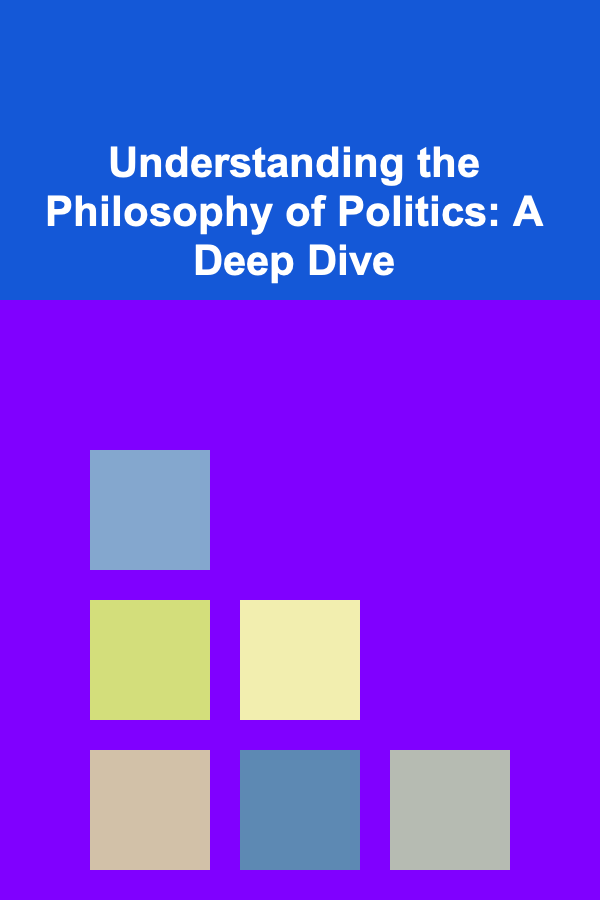
Understanding the Philosophy of Politics: A Deep Dive
ebook include PDF & Audio bundle (Micro Guide)
$12.99$6.99
Limited Time Offer! Order within the next:

The philosophy of politics is a vast and complex field that seeks to understand the nature of political power, authority, justice, rights, and the ideal organization of society. It goes beyond simply observing and describing political phenomena; it critically examines the underlying principles and values that shape our political institutions and practices. Engaging with political philosophy requires a willingness to grapple with fundamental questions about human nature, the good life, and the legitimacy of government. This exploration requires a combination of intellectual rigor, historical awareness, and a commitment to reasoned debate.
What is Political Philosophy? Defining its Scope and Purpose
At its core, political philosophy is a branch of philosophy concerned with the state and its relationship to individuals. It delves into questions such as:
- What is the justification for political authority? Why should we obey the state?
- What are the proper limits of state power? How far can the state interfere in our lives?
- What constitutes a just society? How should resources and opportunities be distributed?
- What are the fundamental rights of individuals? How are these rights protected?
- What is the best form of government? Is democracy always the most desirable option?
Political philosophy differs from political science. While political science aims to describe and explain political behavior through empirical observation and analysis, political philosophy is more concerned with normative questions -- questions about what ought to be, rather than what is. It seeks to develop coherent and defensible moral frameworks for evaluating political institutions and policies. Of course, the two disciplines are often intertwined, as empirical data can inform philosophical arguments, and philosophical considerations can shape the research agenda of political scientists.
Key Concepts in Political Philosophy
Understanding political philosophy requires familiarity with several key concepts. These concepts serve as building blocks for constructing and evaluating political theories:
- Justice: This is arguably the central concept in political philosophy. It refers to the fair and equitable distribution of resources, opportunities, and burdens within a society. Different theories of justice offer competing accounts of what constitutes fairness, such as egalitarianism (equality of outcome), libertarianism (protection of individual rights and minimal state intervention), and utilitarianism (maximizing overall happiness).
- Legitimacy: This refers to the rightfulness of political authority. A legitimate government is one that is recognized by its citizens as having the right to rule. Legitimacy can be based on various factors, such as consent of the governed, tradition, or the perceived effectiveness of the government.
- Rights: These are entitlements that individuals possess against the state or other individuals. Rights can be classified in various ways, such as natural rights (inherent rights that all humans possess), legal rights (rights granted by law), and positive rights (entitlements to certain goods or services, such as healthcare or education).
- Liberty: This refers to the freedom of individuals to act without undue interference from the state or other individuals. There are different conceptions of liberty, such as negative liberty (freedom from external constraints) and positive liberty (the capacity to act autonomously and pursue one's goals).
- Equality: This refers to the idea that all individuals should be treated equally, regardless of their background or characteristics. However, there are different interpretations of equality, such as equality of opportunity (equal access to opportunities) and equality of outcome (equal results).
- Power: This refers to the ability to influence or control the behavior of others. Political philosophy examines the sources and uses of power, as well as the mechanisms for holding power accountable.
A Historical Overview: Key Thinkers and Traditions
The history of political philosophy is rich and diverse, spanning centuries and continents. Understanding the key thinkers and traditions is essential for engaging with contemporary debates.
Ancient Greece: Plato and Aristotle
Plato and Aristotle are foundational figures in Western political thought. Plato, in his Republic , envisioned an ideal state ruled by philosopher-kings, arguing that only those with wisdom and virtue are fit to govern. He was critical of democracy, believing that it could lead to mob rule. Aristotle, in his Politics, took a more empirical approach, studying different forms of government and concluding that the best form of government depends on the specific circumstances of each society. He favored a mixed constitution that combines elements of aristocracy and democracy.
Medieval Period: Augustine and Aquinas
The medieval period saw the integration of Christian theology with political thought. Augustine, in his City of God, distinguished between the earthly city and the heavenly city, arguing that the state should be subordinate to the Church. Thomas Aquinas, influenced by Aristotle, argued that natural law provides the basis for just political order. He believed that the state should promote the common good and that citizens have a right to resist tyrannical rule.
The Enlightenment: Hobbes, Locke, and Rousseau
The Enlightenment marked a turning point in political philosophy, emphasizing reason, individual rights, and the social contract. Thomas Hobbes, in his Leviathan , argued that in the state of nature, life is "solitary, poor, nasty, brutish, and short." To escape this state, individuals must enter into a social contract and submit to an absolute sovereign. John Locke, in his Two Treatises of Government , argued that individuals possess natural rights to life, liberty, and property, and that the purpose of government is to protect these rights. He advocated for a limited government based on the consent of the governed. Jean-Jacques Rousseau, in his The Social Contract, argued that legitimate political authority is based on the general will of the people. He believed that individuals should surrender their individual will to the collective will in order to achieve freedom and equality.
19th Century: Mill and Marx
The 19th century saw the rise of liberalism and socialism. John Stuart Mill, in his On Liberty , defended individual liberty and argued for the importance of free speech and thought. He advocated for a limited government that protects individual rights and promotes individual flourishing. Karl Marx, in his Das Kapital, critiqued capitalism and argued that it is inherently exploitative. He believed that history is driven by class struggle and that the ultimate goal is a communist society in which the means of production are owned collectively.
20th and 21st Centuries: Rawls, Nozick, and Contemporary Debates
The 20th and 21st centuries have witnessed a resurgence of interest in political philosophy. John Rawls, in his A Theory of Justice , developed a theory of justice as fairness, arguing that principles of justice should be chosen from behind a "veil of ignorance," where individuals do not know their social position or other characteristics. Robert Nozick, in his Anarchy, State, and Utopia, defended libertarianism, arguing that individuals have rights to their property and that the state should only be involved in protecting these rights. Contemporary debates in political philosophy include issues such as global justice, environmental ethics, and the challenges of multiculturalism.
Approaches to Understanding Political Philosophy
There are several approaches one can take to understand political philosophy. No single approach is definitive, and a combination of these strategies will likely yield the most comprehensive understanding:
1. Reading Primary Texts
The most direct way to engage with political philosophy is to read the original works of major thinkers. While secondary sources can provide helpful introductions and summaries, they cannot replace the experience of grappling directly with the arguments of Plato, Aristotle, Hobbes, Locke, Rousseau, Mill, Marx, and Rawls. Reading primary texts requires careful attention to detail, a willingness to engage with complex ideas, and a commitment to understanding the historical context in which these ideas were developed.
2. Studying Secondary Sources
Secondary sources, such as textbooks, commentaries, and scholarly articles, can provide valuable insights into the key concepts, arguments, and debates in political philosophy. These sources can help you understand the historical context of philosophical ideas, clarify complex arguments, and identify common themes and disagreements. However, it is important to be critical of secondary sources and to compare different interpretations.
3. Engaging in Critical Discussion
Political philosophy is best understood through critical discussion and debate. Talking to others about philosophical ideas can help you clarify your own thinking, identify weaknesses in your arguments, and develop new perspectives. Participating in seminars, reading groups, or online forums can provide opportunities to engage with others who are interested in political philosophy.
4. Applying Philosophical Concepts to Contemporary Issues
Political philosophy is not just an abstract intellectual exercise; it has practical implications for how we think about and address contemporary political issues. Applying philosophical concepts to real-world problems can help you understand the relevance of these concepts and develop your own informed opinions. For example, you might consider how different theories of justice apply to debates about income inequality, healthcare reform, or environmental policy.
5. Considering Different Perspectives
It is important to be aware of the diversity of perspectives within political philosophy. Different thinkers and traditions offer competing accounts of justice, rights, and the good society. By engaging with these different perspectives, you can develop a more nuanced and critical understanding of political philosophy.
Challenges in Understanding Political Philosophy
Understanding political philosophy is not without its challenges. Here are some of the most common obstacles:
- Abstractness: Political philosophy often deals with abstract concepts and theoretical arguments, which can be difficult to grasp.
- Complexity: The ideas of major political philosophers are often complex and nuanced, requiring careful study and reflection.
- Historical Context: Understanding the historical context in which philosophical ideas were developed is essential for interpreting them accurately.
- Competing Interpretations: There are often multiple interpretations of the same philosophical text, making it difficult to determine the "correct" interpretation.
- Bias: Political philosophy is often influenced by the personal beliefs and values of the philosopher, which can lead to bias.
To overcome these challenges, it is important to be patient, persistent, and open-minded. Reading widely, engaging in critical discussion, and reflecting on your own beliefs and values can help you develop a deeper understanding of political philosophy.
The Relevance of Political Philosophy Today
In an era marked by profound political and social challenges, the study of political philosophy remains deeply relevant. From navigating the complexities of globalization to addressing issues of inequality and climate change, political philosophy offers a framework for critical analysis and informed decision-making.
Understanding Justice: Political philosophy provides the tools to analyze and evaluate different conceptions of justice in the context of contemporary issues, such as income inequality, healthcare access, and criminal justice reform.
Defending Rights and Liberties: In a world where individual rights and liberties are increasingly challenged, political philosophy offers a principled defense of these fundamental values and helps us to identify and resist threats to freedom and autonomy.
Promoting Democracy and Participation: Political philosophy explores the foundations of democracy and offers insights into how to promote greater civic engagement and participation in the political process. It allows us to critically examine the limitations of existing democratic institutions and to explore alternative models of governance.
Addressing Global Challenges: Political philosophy provides a framework for addressing global challenges such as climate change, poverty, and conflict by helping us to understand the ethical obligations of states and individuals to one another.
Enhancing Critical Thinking: Studying political philosophy cultivates critical thinking skills, enabling us to analyze arguments, identify biases, and form our own informed opinions on political issues.
Conclusion
Understanding the philosophy of politics is a journey of intellectual exploration that can enrich your understanding of the world and empower you to become a more engaged and informed citizen. By engaging with the ideas of major political thinkers, studying secondary sources, participating in critical discussion, and applying philosophical concepts to contemporary issues, you can develop a deeper appreciation for the complexities of political life and contribute to the ongoing conversation about how to create a more just and equitable society. While challenging, the rewards of understanding political philosophy -- a greater awareness of the values that shape our world, and the critical thinking skills needed to engage with complex problems -- are well worth the effort.

How to Build Passive Income with AI-Driven Software
Read More
How to Make Family Holidays Special with Traditions and Activities
Read More
How to Secure Your Home When You Have a Dog or Pet
Read More
How to Use Online Research Skills to Make Money
Read More
How to Use Plastic Containers for Long-Term Storage of Supplies
Read More
Mastering Graphic Design: Strategies and Techniques for the Graphic Design Specialist
Read MoreOther Products

How to Build Passive Income with AI-Driven Software
Read More
How to Make Family Holidays Special with Traditions and Activities
Read More
How to Secure Your Home When You Have a Dog or Pet
Read More
How to Use Online Research Skills to Make Money
Read More
How to Use Plastic Containers for Long-Term Storage of Supplies
Read More